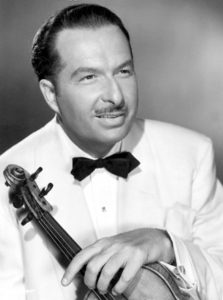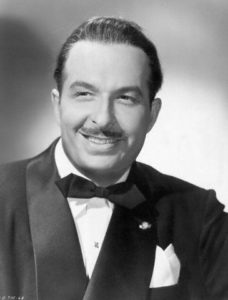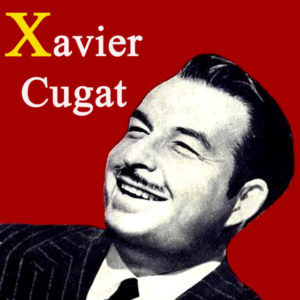 XAVIER CUGAT, BANDLEADER, VIOLINIST, COMPOSER.
XAVIER CUGAT, BANDLEADER, VIOLINIST, COMPOSER.
Xavier Cugat was born as Francisco de Asis Javier Cugat Mingall de Bru y Deulofeu in Girona, Spain on January 1,1900. His parents moved to Cuba when he was a child. Xavier was five years old.
He learned to play the violin at an early age. He was trained as a classical violinist and played with the Orchestra of the Teatro Nacional in Havana. On 6 July 1915, Cugat and his family arrived in New York as immigrant passengers on board the S.S. Havana. Cugat appeared in recitals with Enrico Caruso, playing violin solos.
He was a bandleader who spent his formative life for years in Havana, Cuba. A trained violinist and arranger, he was a personality in the spread of Latin music in United States popular music. He was also a cartoonist. In New York, he was the leader of the resident orchestra at the Waldorf-Astoria before and after World War II.
Hollywood and New York.
In the late 1920s, as sound began to be used in films, Cugat put together another tango band that had some success in early short musical films. And by the early 1930s, he began appearing with his group in feature films. His first notable appearance occurred in 1942, in the Columbia production You Were Never Lovelier with Rita Hayworth, Fred Astaire, and Adolphe Menjou.
Most of Cugat’s subsequent movies were made at Metro-Goldwyn-Mayer studios, including Week-End at the Waldorf (1945), Holiday in Mexico (1948), A Date with Judy (1948), Luxury Liner (1948), and the Esther Williams musicals Bathing Beauty (1944), This Time for Keeps (1947), On an Island with You (1948), and Neptune’s Daughter (1949). One of his trademarks was to hold a Chihuahua while he waved his baton with the other arm.
https://youtu.be/iP0DyEHqnm4
Cugat recorded on Columbia Records (1940s and 1950s, also Columbia’s Epic label), RCA Victor (1930s and 1950s), Mercury Records (1951–1952 and 1960s) and Decca Records (1960s). Dinah Shore made her first recordings as a vocalist with Cugat in 1939 and 1940 (Victor Records). In 1940, his recording of “Perfidia” became a big hit. Cugat followed trends closely, making records for the conga, the mambo, the cha-cha-cha, and the twist when each was in fashion. Several of the songs he recorded, including “Perfidia”, were used in the Wong Kar-wai films Days of Being Wild and 2046. In 1943, “Brazil” was a big hit, reaching No. 17 in the Billboard Top 100.
Personal Life. Marriages
Cugat was married five times. His first marriage was to Rita Montaner (1918–1920); his second was to Carmen Castillo (1929–1944); his third to Lorraine Allen (1947–52); his fourth to singer Abbe Lane (1952–64); and his fifth to Spanish guitarist and comic actress Charo (1966–78).
https://youtu.be/KTq1Sq5mXd4
Death.
Cugat died of heart failure, at the age of 90, in Barcelona October 27, 1990. He was buried in his native Girona.
 XAVIER CUGAT, BANDLEADER, VIOLINISTA, COMPOSITOR.
XAVIER CUGAT, BANDLEADER, VIOLINISTA, COMPOSITOR.
Xavier Cugat nació como Francisco de Asis Javier Cugat Mingall de Bru y Deulofeu en Girona, España, el 1 de enero de 900. Sus padres se mudaron a Cuba cuando era un niño. Xavier tenía cinco años.
Aprendió a tocar el violín a una edad temprana. Fue entrenado como violinista clásico y tocó con la Orquesta del Teatro Nacional en La Habana. El 6 de julio de 1915, Cugat y su familia llegaron a Nueva York como pasajeros inmigrantes a bordo del S.S. La Habana. Cugat apareció en recitales con Enrico Caruso, tocando solos de violín.
Fue un director de orquesta que pasó su vida formativa durante años en La Habana, Cuba. Un violinista y arreglista entrenado, fue una personalidad en la difusión de la música latina en la música popular de los Estados Unidos. Él también era dibujante. En Nueva York, fue el líder de la orquesta residente en el Waldorf-Astoria antes y después de la Segunda Guerra Mundial.
Hollywood y Nueva York.
A fines de la década de 1920, cuando el sonido comenzó a utilizarse en el cine, Cugat formó otra banda de tango que tuvo cierto éxito en las primeras películas musicales cortas. Y a principios de la década de 1930, comenzó a aparecer con su grupo en largometrajes. Su primera aparición notable ocurrió en 1942, en la producción de Columbia You Were Never Lovelier con Rita Hayworth, Fred Astaire y Adolphe Menjou.
La mayoría de las películas posteriores de Cugat se hicieron en los estudios Metro-Goldwyn-Mayer, incluyendo Week-End en el Waldorf (1945), Holiday in Mexico (1948), A Date with Judy (1948), Luxury Liner (1948) y el Esther Los musicales de Williams, Bathing Beauty (1944), This Time for Keeps (1947), En una isla contigo (1948), y Neptune’s Daughter (1949). Una de sus marcas registradas era sostener un Chihuahua mientras agitaba su bastón con el otro brazo.
Cugat grabó en Columbia Records (1940 y 1950, también Columbia’s Epic label), RCA Victor (1930 y 1950), Mercury Records (1951-1952 y 1960) y Decca Records (1960). Dinah Shore hizo sus primeras grabaciones como vocalista con Cugat en 1939 y 1940 (Victor Records). En 1940, su grabación de “Perfidia” se convirtió en un gran éxito. Cugat siguió de cerca las tendencias, haciendo récords para la conga, el mambo, el cha-cha-cha y el giro cuando cada uno estaba de moda. Varias de las canciones que grabó, incluyendo “Perfidia”, fueron usadas en las películas Wong Kar-wai Days of Being Wild y 2046. En 1943, “Brazil” fue un gran éxito, alcanzando el número 17 en el Billboard Top 100.
Vida personal. Matrimonios
Cugat se casó cinco veces. Su primer matrimonio fue con Rita Montaner (1918-1920); el segundo fue para Carmen Castillo (1929-1944); el tercero de Lorraine Allen (1947-52); su cuarto al cantante Abbe Lane (1952-64); y su quinta al guitarrista y actriz cómica española Charo (1966-78).
http://youtu.be/8lWPg1A6Q_U
Muerte.
Cugat murió de insuficiencia cardíaca, a la edad de 90 años, en Barcelona el 27 de octubre de 1990. Fue enterrado en su Girona natal.
Agencies/Various/Internet Photos/YouTube/ Arnoldo Varona/ TheCubanHistory.com
THE CUBAN HISTORY, HOLLYWOOD.







